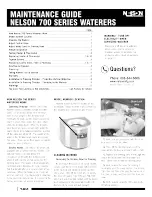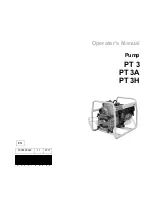
MH Series Horizontal Multi-stage Pump
5
Piping the Well
Suction tapping on the pump is 1-1/4
"
(1-1/2
"
for 45 gpm) (FNPT) in size. Suction pipe diameter
should never be smaller than the suction tapping.
A pump performs best when installed close to the well because suction lift and friction losses
are kept to a minimum. Although an installation near the water source is preferred, it may be
necessary or more convenient to locate the pump away from the well, lake or stream.
FOR A
SHALLOW WELL INSTALLATION
, the offset is limited only by the suction lift and the friction in
the plumbing system.
Plan your piping layout before starting the installation so that the correct pipe and fittings are
on hand to complete the job. Keep the pipes clean, since pebbles and other foreign material
can block the pump impeller and hinder operation. To avoid air pockets slope horizontal pipes
continuously upward from water source to pump by at least 1 vertical inch for every 30
"
of
horizontal run.
Horizontal Offset Suction Piping
When the pump is offset from the well, the horizontal offset suction piping may have to be
increased in diameter to reduce friction loss. The friction loss in a system increases:
1. As the flow rate increases;
2. As the piping size decreases.
Consult included performance tables (Appendix I) and friction loss tables (Appendix II) to
determine the amount of head lost for a given application. Pipes from the well to the pump should
slope upward (about 1
"
of rise for every 30
"
of run).
Discharge Pipe Sizes for Installation
When the pump is located at a distance from points of water use, it is necessary to increase the
discharge pipe size in order to reduce friction loss. The friction loss in a system increases:
1. As the flow rate increases;
2. As the piping size decreases.
Consult included performance tables (Appendix II) and friction loss tables (Appendix III) to
determine the amount of head lost for a given application.
Shallow Well Installation (Figure 1)
Connect pump to well as shown in Figure 1. Shallow well operation, suitable for depths not
exceeding 10 feet, requires only a single pipe to the water source. Typical water sources are
wells, lakes, ponds, streams or rivers. Support the suction pipe so its weight is not carried by the
pump. Installation should include a foot valve in the well or a check valve close to the pump. If the
distance from the well to the pump is more than 40 horizontal feet, a check valve (installed close to
the pump) is recommended in addition to the foot valve. The choice of using a check valve at the
pump or a submerged foot valve depends on the individual installation parameters. A foot valve is
required for a cased/dug well. Special care should be taken to ensure that all suction fittings are
tight and sealed. Otherwise, the pump cannot be primed or will lose prime over a period of time.






































